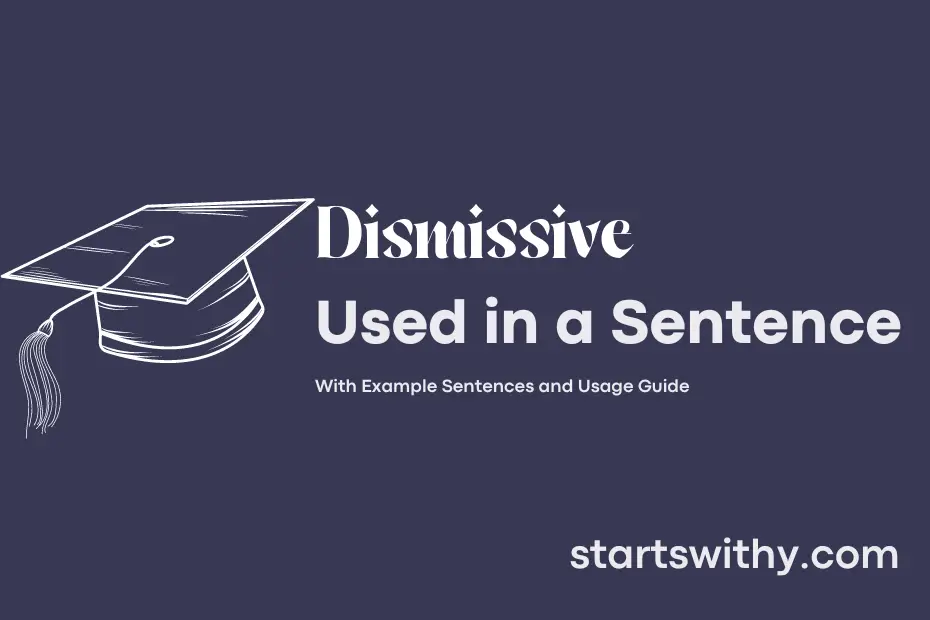Have you ever been in a conversation where someone was completely disregarding your opinions or ideas? This kind of response is often described as dismissive, characterized by a lack of respect or consideration for what the other person is saying.
In a dismissive interaction, one party may downplay, ignore, or brush off the thoughts or feelings of another, creating a sense of invalidation or disrespect. This behavior can lead to strained relationships and communication breakdowns, as it fails to acknowledge the value of differing perspectives.
7 Examples Of Dismissive Used In a Sentence For Kids
- Rohan’s mother gave him a dismissive look when he asked for more chocolates.
- The teacher was dismissive of Ria’s excuse for not doing her homework.
- Aarav’s friends were dismissive of his new toy car.
- The cat gave a dismissive meow when asked to come inside.
- The chef was dismissive of the customer’s complaint about the spicy food.
- The bird chirped dismissively when the squirrel tried to join in its song.
- The librarian gave a dismissive wave when asked for a book that was out of stock.
14 Sentences with Dismissive Examples
- Dismissive of the professor’s explanation, the student continued to scroll through social media on their phone.
- The senior student’s attitude towards the freshmen was dismissive, making them feel unwelcome in the college.
- The counselor’s response to the student’s concerns was surprisingly dismissive, leaving them feeling unheard.
- The group project was not going well as some members were being dismissive of others’ ideas.
- The student’s dismissive behavior towards their grades landed them in academic probation.
- The librarian’s dismissive attitude towards the student asking for help was disheartening.
- The guest speaker’s dismissive tone towards questions from the audience was off-putting.
- The student’s dismissive attitude towards attending classes was affecting their overall performance.
- The professor’s dismissive remark about the importance of extracurricular activities upset many students.
- The college administration’s dismissive response to student feedback led to a lack of trust among the student body.
- The student’s dismissive view of networking events was hindering their chances of securing internships.
- The dean’s dismissive behavior towards student complaints showed a lack of empathy.
- The student’s dismissive attitude towards career counseling services was hindering their job search prospects.
- The professor’s dismissive attitude towards students seeking clarification on the assignment left many feeling confused and frustrated.
How To Use Dismissive in Sentences?
To use Dismissive in a sentence, start by identifying a situation where someone is showing a lack of interest or respect towards something or someone. For example, “She was dismissive of his ideas during the meeting.” In this sentence, Dismissive is used to show that the woman did not take his ideas seriously and disregarded them.
Another way to use Dismissive is in a situation where someone is being treated with indifference or disregard. For instance, “He was dismissive of her concerns, which hurt her feelings.” Here, Dismissive is used to convey the idea that he showed a lack of concern for her feelings.
When using Dismissive in a sentence, remember that it is important to consider the context in which the word is being used. It is often used to describe a behavior or attitude that belittles or ignores someone or something.
In summary, using Dismissive in a sentence involves showing a lack of interest, respect, or concern towards someone or something. By understanding the meaning and context of the word, you can effectively convey a sense of indifference or disregard in your writing or conversation.
Conclusion
In summary, dismissive sentences convey a sense of disregard or lack of importance towards the subject being discussed. These types of statements often undermine the significance of ideas or emotions, leading to tension or a lack of understanding in communication. Examples of dismissive sentences include phrases like “It’s not a big deal,” “Whatever,” or “I don’t care.”
By recognizing and avoiding dismissive language in conversations, individuals can promote a more respectful and open dialogue. Listening attentively and responding thoughtfully can encourage greater empathy and cooperation in relationships. Choosing words that acknowledge and validate others’ perspectives can foster healthier interactions and contribute to more positive and meaningful connections with those around us.



